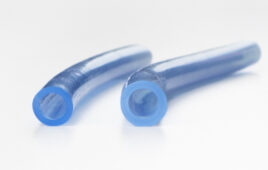Testing is one of the key efforts to control COVID-19, and U.S. diagnostic test production capabilities are in demand. To respond to the pandemic with urgency, test developers need a highly flexible, scalable supply chain that can move quickly, control costs and manage quality.
Claudio Hanna and Jennifer Ponti, Web Industries

Web Industries uses an an automated production line for cutting test strips and inserting them into cartridges at its Lateral Flow Immunoassay (LFI) Center of Excellence in Holliston, Mass. (Image courtesy of Web Industries)
If COVID-19 has taught us one thing, it is to expect the unexpected. Original equipment manufacturers (OEMs) must be ready to produce enough diagnostic tests amid uncertainty about how the virus may evolve.
Outsourcing production to a contract manufacturing organization (CMO) can save an OEM time and money, giving device developers the flexibility to ramp up their test volume without taking on the long-term overhead of a greenfield factory or plant acquisition.
When choosing a CMO, it’s important to consider a prospective partner’s current capacity, medical device experience (including work with specific technologies) and ability to expand its manufacturing footprint. Several core competencies influence a CMO’s readiness to scale, whether it is taking a new COVID-19 test concept from the laboratory bench to commercial production or duplicating an entire manufacturing plant. Here are three things a CMO must have in order to scale up manufacturing for one type of COVID-19 diagnostic device, the lateral flow immunoassay (LFI) antigen test.
Well-established technology transfer protocols
Technology transfer entails a carefully controlled, stage-gated transition of a device from the developer’s blueprint to mass-scale production. This should involve documentation of the inputs and processes used to make prototypes or initial batches of the test. It also should include thorough documentation and discussion of the CMO’s plans for mass-producing the device, including how quality and performance will be validated. Expect the CMO to conduct a raw material assessment to ensure all materials are available in the quantity and format needed for high-speed commercial production.
Expertise with robotics and automation
Automation enables CMOs to increase throughput and meet high-volume requirements while ensuring products meet tight quality tolerances. For example, using continuous processes vs. manual methods allows a contractor to reduce operator errors and decrease material scrap rates. Automated process control is critical at multiple points. A CMO may use cameras, sensors, checkweighers and other inspection devices to remove subjectivity from visual inspections of finished LFI devices to decrease the risk of defects.
Multifaceted capabilities and existing systems
The more capabilities a CMO has under one roof, the more seamless and efficient it will be at scaling up COVID-19 test production. These should encompass all aspects of test device production, from incoming raw materials inspection to work-in-process steps (chemistry preparation and deposition, etc.) to final device assembly and packaging. That’s not to say the CMO needs to make every single component and material in-house, but it should have the right systems, from QC to the supply chain, in place from the start.
A supply chain needed to produce a full COVID-19 test kit typically includes a variety of flexible materials, specialty chemicals, swabs, vials, plastic cassette housings and packaging. The CMO should be able to produce a single component for a test or to format materials for use downstream by another contractor or the OEM. Systems must be primed and ready to accommodate diverse manufacturing needs and business models.
As COVID-19 diagnostic test production continues, device developers and OEMs will be challenged to bring new products to market more rapidly than ever. CMO partnerships will play a key role in ensuring COVID-19 tests can be manufactured using reliable, repeatable and scalable processes. Diagnostic test developers and contract manufacturers can close the testing capacity gap.
Claudio Hanna and Jennifer Ponti are business development managers for Web Industries Inc.’s medical division. Hanna has more than 20 years of experience in flexible goods, start-up manufacturing and automation. Ponti’s professional background includes over 15 years of experience with lateral flow devices.
The opinions expressed in this blog post are the author’s only and do not necessarily reflect those of Medical Design and Outsourcing or its employees.




